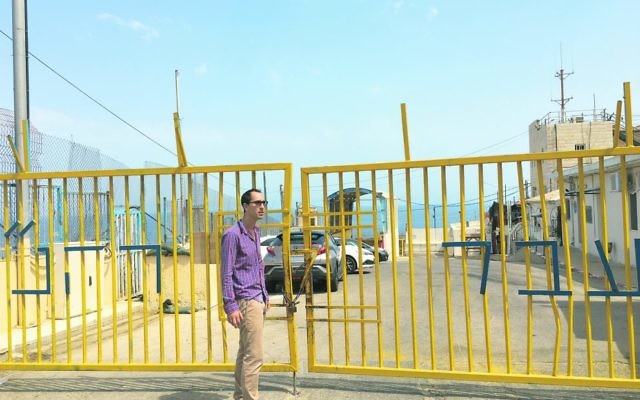The gate to chaos
Beyond the gate to the Israel–Lebanon border lies the world of Hezbollah and, if you carry on straight into Lebanon and turn right to Syria, the drama of the Syrian civil war.
IT’S a surreal feeling standing at this yellow gate, kept shut by just a flimsy chain and a padlock. Because beyond this gate lies a whole world of chaos which, this week as I sweated there in the hot sun, was developing at such dizzying speed that Israelis couldn’t keep up.
This is the Israel–Lebanon border, and beyond this gate lies the world of Hezbollah and, if you carry on straight into Lebanon and turn right to Syria, the drama of the Syrian civil war.
It’s quiet here, apart from the occasional UN Jeep. Which is strange given the industry that, we have just learned, is going on close by. There are new revelations that Iran, via its proxy Hezbollah, is establishing new underground weapons factories in Lebanon to produce arms that local militants can soon get their hands on. One of these factories is by the Lebanese city of Tyre, which is 23km away — just three times the distance you would travel southwards in Israel to get a good falafel.
What is more, Hezbollah could well be looking at this border crossing right now. Israel has just complained to the United Nations that Hezbollah has set up 15 lookout posts close to its border over the last year.
The threat that lies through these gates is discussed more and more by military and defence officials in Israel these days. Avigdor Lieberman, Israel’s Defence Minister, said that he knows about the new weapons factories and that “we know what needs to be done”.
The revelations about the new weapons factory underscore just how much muscle Iran is flexing in this region. Iran exports more weapons than it would like to to Hezbollah, so it is setting the group up with fortified factories to produce the arms itself. This suggests that Iran is pouring more money into Hezbollah’s military endeavours in Lebanon than was previously understood.
What is becoming clearer and clearer is that Iran sees the land that lies beyond the yellow gate – Lebanon and Syria alike – as an arena where it can effectively consolidate power. Tehran hopes that the arms it funds will flow from Syria to Lebanon and vice-versa. It sees a region where its fire-power will determine the future.
And this issue of Iranian power has never been more relevant than right now with a new ceasefire underway in southern Syria since Sunday afternoon. A ceasefire brokered for the first time by superpowers America and Russia. This one may be the real thing, Zaki Shalom, senior research fellow at the Institute for National Security Studies, tells me.
It is a “very significant” development, and could lead to the civil war being brought under control across Syria and arrangements made to end hostilities.
“If the ceasefire will hold, this could signify there is some understanding with the superpowers regarding the future of Syria, that eventually they will go for a division of Syria,” Shalom says.
This moment, when understandings are reached to determine how Syria will look in the future, will be the moment truth for Israel. The big question in Jerusalem will be how much influence Iran, the best friend and key patron of the Syrian regime, will be able to retain for the long haul.
For Israel, the massive influence Iran has built in Syria during the course of the civil war is alarming, and any post-war picture that allows it to retain strength in Syria will be a bad one. But the rooting out of Iranian power from post-war Syria is looking less and less likely.
In just the last few days we have seen the likely model for ceasefire agreements, namely that Iran’s ally Russia will be expected to play a key role and protect Iranian interests in Syria. And meanwhile we are seeing the ramping up of Iranian-funded weapons production in Lebanon. Iranian power, it seems, is likely to become a long-term fixture on Israel’s borders.
A large-scale ceasefire may be on the cards for Syria, but for Israel, the real action may just be beginning.
NATHAN JEFFAY


comments